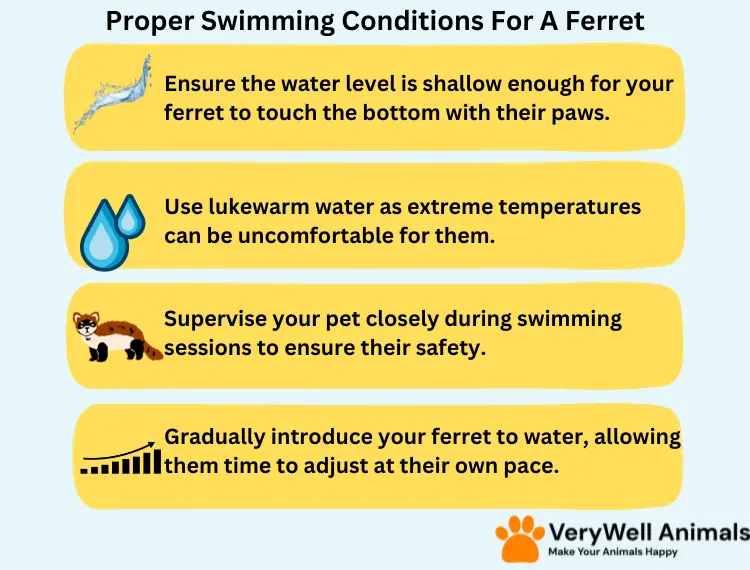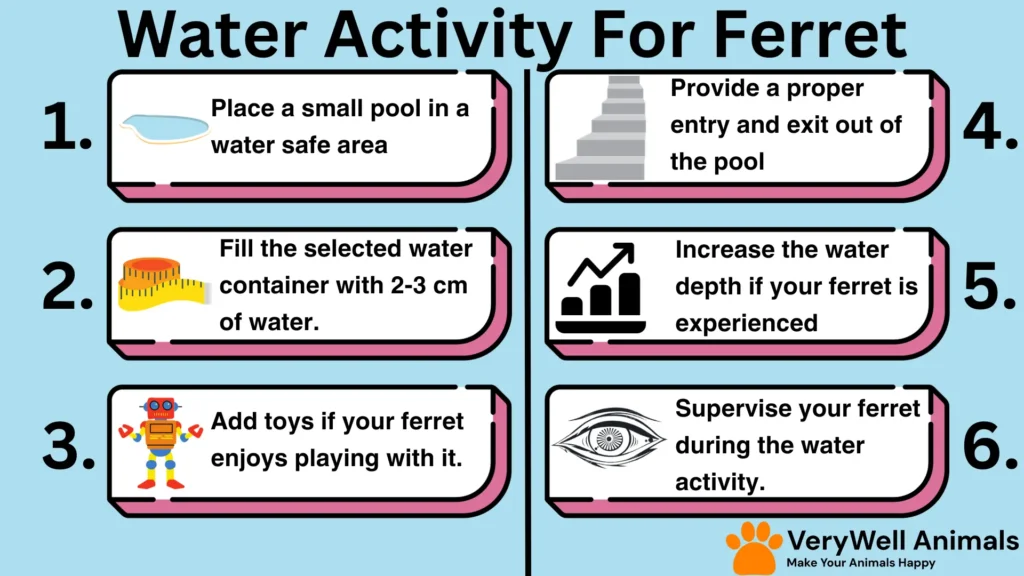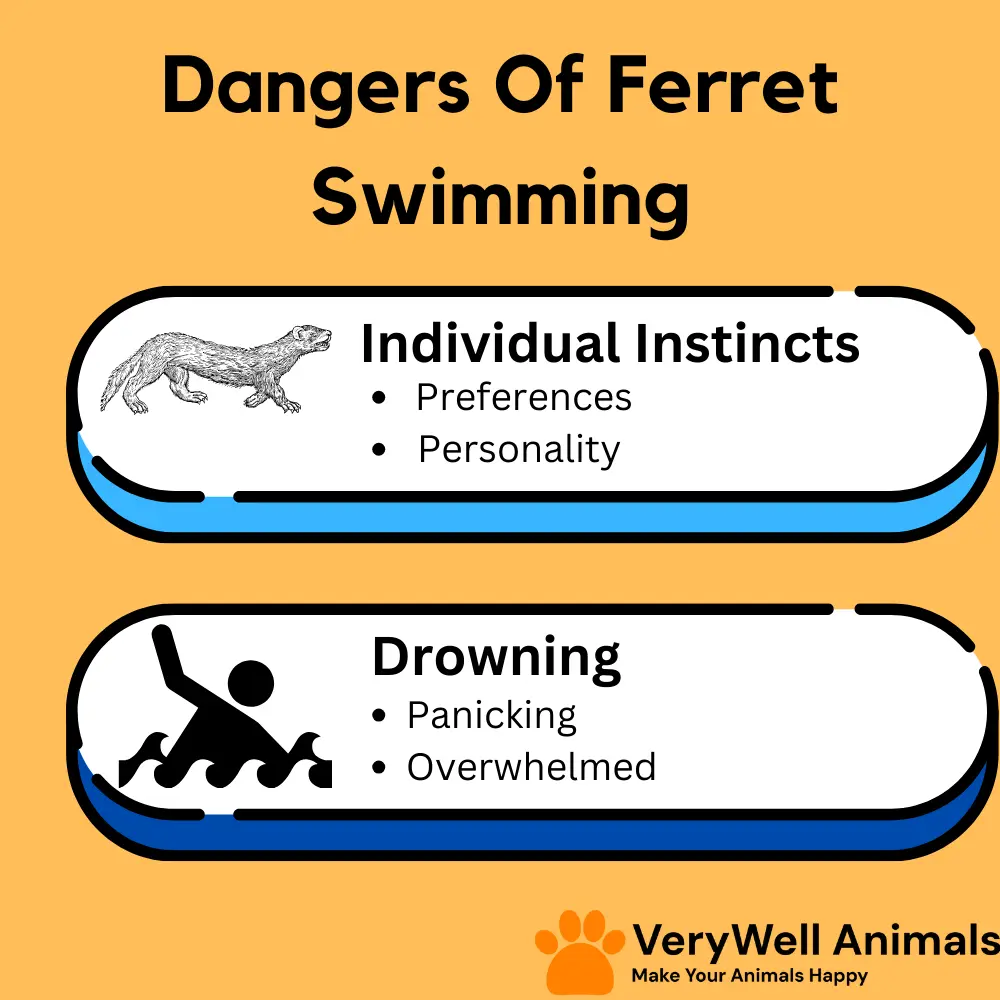Can Ferrets Swim? Do They Like It? (With Water Activity Tips!)

Ferrets are good swimmers and their slender body allows them to swim properly. Some ferrets might enjoy it and some might not but with proper training, guidance, and entertainment you can make your ferrets swim very well.
This article explains about knowing if your ferrets like swimming, frequency of ferret swimming and many other questions frequently asked by ferret owners. The following are the topics covered in this article
- Do Ferrets Like To Swim?
- How To Know If Your Ferret Likes Water or Likes Swimming?
- How Often Can I Let My Ferret Swim?
- Can Ferrets Swim Underwater?
- Can Ferrets Swim In Salt Water?
- Can Ferrets Swim In A Bathtub Or Pool?
- Do Ferret Swim In the Wild?
- What Are the Dangers Of Ferret Swimming?
Do Ferrets Like To Swim?
It depends on the individual ferret whether they like it or notFerrets are known to be good swimmers, but it’s important to remember that they can get exhausted quickly. Keeping swim sessions short and providing plenty of rest breaks is essential in preventing fatigue.
While some ferrets may enjoy swimming, others may not share the same enthusiasm for aquatic activities. As an owner, it’s crucial to understand your ferret’s preferences and take necessary precautions when introducing them to water.
What Are the Proper Swimming Conditions For A Ferret?
To have the proper swimming conditions for a ferret follow these guidelines
- Ensure the water level is shallow enough for your ferret to touch the bottom with their paws.
- Use lukewarm water as extreme temperatures can be uncomfortable for them.
- Supervise your pet closely during swimming sessions to ensure their safety.
- Gradually introduce your ferret to water, allowing them time to adjust at their own pace.
This diagram shows the proper swimming conditions for a ferret

How To Know If Your Ferret Likes Water or Likes Swimming?
To determine if your ferret likes water or swimming, you can conduct a simple test by following the steps given below
- Start by gently placing their back legs and tail into the water.
- Slowly lower the rest of their body into the water while supporting them.
- Pay close attention to how your ferret reacts.
If your ferret starts swimming and moving around comfortably in the water, it is a clear indication that they enjoy being in the water. They may paddle their paws, dive, or even playfully splash around.
On the other hand, if your ferret shows signs of distress or tries to escape from the water, it suggests that they do not like being submerged. They may exhibit behaviors such as trying to climb out of the container or frantically paddling to find an exit.
It’s important to note that each ferret has its own unique personality and preferences. While some ferrets may take naturally to swimming, others might feel uneasy or fearful in water. It is essential to respect your pet’s boundaries and never force them into a situation they are uncomfortable with.
What Are the Recommended Water Activities For Ferrets?

According to Laurel M. Harris, Doctor of Veterinary Medicine the following is the water activity recommended for ferrets
- Place a small pool in a water-safe area such as a backyard, or clear a bathtub for your ferret to play in.
- Fill the selected water container with 2-3 cm of water.
- Add toys if your ferret enjoys playing with it.
- Provide a proper entry and exit out of the pool by using steps, a stool, or another tool for the ferret.
- Increase the water depth if your ferret has engaged in water activities in the past. Some ferrets like it deeper than the usual.
- Supervise your ferret during the water activity.
How Often Can I Let My Ferret Swim?
Ferrets can swim as much as they like but do not make them very exhausted as it can lead to drowning. When allowing your ferret to play in water, it’s important to exercise caution and consider a few factors.
Firstly, be mindful of the chemicals present in the water. Harsh chemicals such as chlorine can irritate a ferret’s sensitive skin. It’s best to avoid exposing them to excess chlorine or any other skin-aggravating substances.
Secondly, consider the depth of the water. Ferrets are not natural swimmers like some other animals, so it’s crucial to keep the water shallow enough for them to touch the bottom with their paws. This allows them to conserve energy and feel more secure while playing in the water.
It is essential not to let your ferret spend too much time in water as excessive exposure can dry out their skin. Limit bath time to about once a month to maintain their skin’s moisture balance.
Lastly, always supervise your ferret when they are near water. Accidents can happen quickly, and having someone present ensures their safety.
Can Ferrets Swim Underwater?
Ferrets are known for their playful and curious nature, but they have their limitations. While they may enjoy splashing around in shallow water, ferrets do not safely swim underwater like some other animals. Instead, they prefer a more cautious approach to water activities.
Ferrets’ Snorkeling Habits
Rather than fully submerging themselves in water, ferrets may engage in a behavior called “snorkeling.” This involves sticking their nose below the surface of the water while keeping the rest of their body above it. It’s almost as if they’re using their nose as a snorkel! This behavior allows them to explore and interact with water without fully immersing themselves.
No Full-Body Swimming
Unlike aquatic animals that can swim effortlessly from one point to another, ferrets do not typically use swimming as a means of transportation. Their bodies are not adapted for efficient movement through water. Therefore, attempting to make them swim long distances or submerge themselves completely can be overwhelming and stressful for them.
Face Dipping is Acceptable
While full-body swimming may not be suitable for ferrets, it is acceptable to let them have some fun by allowing them to put their faces in a small bowl of water. Ferrets have an impressive ability to hold their breath and can enjoy this activity without any harm. Just make sure the bowl is shallow enough for easy access and supervision is provided at all times.
Can Ferrets Swim In Salt Water?
Ferrets are capable of swimming in saltwater, but it’s important to be mindful of certain considerations to ensure their safety and well-being. Here are some key points to keep in mind when it comes to ferrets swimming in saltwater:
Salt Poisoning Risk
While ferrets can swim in saltwater, excessive consumption of saltwater can lead to salt poisoning. This is because their bodies are not equipped to handle high levels of salt. It’s crucial to monitor your ferret closely while they’re at the beach or near the ocean to prevent them from ingesting too much saltwater.
Prevent Ingestion Of Salt Water
To minimize the risk of your ferret ingesting saltwater, it’s advisable to keep a close eye on them and discourage them from drinking the water. You can do this by gently redirecting their attention away from the water or offering them fresh water as an alternative.
Rinsing After Swimming
After your ferret has finished swimming in saltwater, it’s essential to rinse them off with freshwater. This helps remove any residual salt from their fur and skin, preventing potential skin irritation and ensuring that their coat doesn’t dry out.
Have A Safe Exit Strategy
When allowing your ferret to swim in the ocean, it’s crucial to use a small, lightweight harness that fits properly. This will help you maintain control over your pet and ensure their safety while they’re in the water. Always provide a safe exit point for your ferret so that they can easily get out of the water when they’ve had enough.
Can Ferrets Swim In A Bathtub Or Swimming Pool?

Ferrets can swim in a bathtub or a swimming pool, but their preferences can vary. When allowing ferrets to play in water, it is important to be cautious of the chemicals used and the depth of the water.
To ensure the safety and comfort of your ferret during bath time or playtime in water, here are some key considerations:
Be Cautious of Harsh Chemicals and Water Depth
When bathing your ferret or allowing them to play in a swimming pool or bathtub, it is crucial to avoid using harsh chemicals that may irritate their sensitive skin. Opt for gentle, pet-safe shampoos and cleansers specifically designed for ferrets.
Make sure the water is not too deep. It’s best to keep it shallow so that your ferret can touch the bottom with their paws. This allows them to conserve energy while swimming or playing in water.
Limit Bath Time to Avoid Drying Out Their Skin
While some ferrets may enjoy being in the water more frequently, it is generally recommended to limit bath time to about once a month. Frequent baths can dry out their skin and strip away natural oils, leading to skin issues.
Avoid Exposing Ferrets to Excess Chlorine or Skin-Aggravating Chemicals
If you choose to let your ferret swim in a swimming pool, avoid exposing them to excess chlorine or other chemicals that may irritate their delicate skin. Ensure that any chemicals used are safe for pets and won’t cause any harm.
Always Supervise Your Ferret Near Water
It’s essential always to supervise your ferret when they are near water. Accidents can happen quickly, so keeping a close eye on them will help prevent any mishaps.
By following these guidelines and considering your ferret’s preferences and safety, you can create an enjoyable experience for both you and your furry friend during water playtime.
Do Ferret Swim In the Wild?
Ferrets have the ability to swim if given the opportunity although domesticated ferrets may not have as much exposure to natural bodies of water as their wild counterparts. In the wild, ferrets exhibit similar characteristics to polecats.
Ferrets, being domesticated cousins of the European polecat, share many instinctual behaviors and environmental preferences with their wild counterparts. Just like polecats, ferrets prefer to live near water. Waterways play a crucial role in the travel and exploration of polecats in their natural habitat.
Polecats are known for being strong swimmers and they thoroughly enjoy various water sources, particularly freshwater ones. Swimming is an innate ability that comes naturally to them. Water is not only essential for their survival but also plays a significant role in their hunting activities and movement across different habitats.
It is important to note that while ferrets can swim, not all individual ferrets may be comfortable or inclined towards swimming. Just like humans have varying levels of comfort in water activities, some ferrets may show more interest and aptitude for swimming than others.
What Are the Dangers Of Ferret Swimming?
Ferrets are capable of swimming due to their slender bodies and waterproof coats. However, not all ferrets have the instinct or desire to swim. It is important to be aware of the potential dangers associated with ferret swimming such as
Individual Instincts
Each ferret has its own unique personality and preferences. While some may enjoy swimming, others may feel uncomfortable or fearful in the water. It is essential to respect your ferret’s individual instincts and never force them into a situation they are uncomfortable with.
Risk of Drowning
Ferrets can panic when placed in deep water, which can lead to the risk of drowning. Their small size and lack of natural buoyancy make it difficult for them to stay afloat if they become overwhelmed or frightened. To prevent this, it is best to avoid putting ferrets in deep water.

How To Prevent the Dangers Of Ferret Swimming?
To provide a safe environment for your ferret to enjoy water play, consider using shallow water basins instead of deep pools or tubs. This allows them to explore and splash around without the risk of submerging themselves completely.
When allowing your ferret near any body of water, whether it’s a basin or even a bathtub, it is crucial always to supervise them closely. This ensures that you can intervene quickly if any issues arise and prevents accidents from occurring.
FAQs
No, it is not recommended to use regular shampoo when bathing your ferret. Ferrets have sensitive skin that can easily become irritated by harsh chemicals found in human shampoos. It is best to use a specially formulated ferret shampoo that is gentle on their skin and fur.
Ferrets have natural oils on their skin that help keep their coat healthy. Over-bathing can strip away these oils and cause dryness or skin issues. Generally, it is recommended to bathe your ferret once every 1-3 months unless they get particularly dirty or smelly.
No, it is not safe to leave your ferret unsupervised while swimming. Even though some ferrets are natural swimmers, accidents can happen. Always keep a close eye on your ferret during swimming sessions to ensure their safety.
The water temperature should be lukewarm when bathing your ferret. Water that is too hot or too cold can be uncomfortable and potentially harmful to your furry friend. Test the water with your hand or a thermometer before introducing your ferret.
Using a hairdryer on low heat or cool setting can help speed up the drying process after bathing your ferret. However, make sure to keep the dryer at a safe distance from your pet and avoid using high heat settings, as it can cause burns or discomfort. Patting them gently with a towel and allowing them to air dry in a warm room is also an option.
Last Updated on 3 March 2024
Waman Nuka is a seasoned wordsmith and a passionate animal enthusiast with decades of experience in the world of animal care. With a deep love for all creatures great and small, Waman’s journey in the realm of animals started as a young boy exploring the lush forests surrounding his childhood home.


